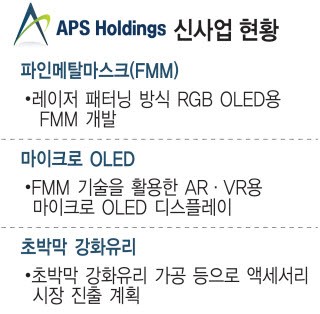APS Holdings is attempting to develop ultra-thin tempered glass, otherwise known as 'Ultra Thin Glass (UTG)'. APS Holdings has adopted it as a new business and is pursuing it as a future prospect. Attention is being paid on whether it will be able to establish itself as a new growth engine alongside fine metal mask (FMM) and micro organic light emitting diodes (OLED), which APS Holdings is preparing.
APS Holdings is developing ultra-thin tempered glass with its affiliated R&D organization. Ultra-thin tempered glass is extremely thin, with a thickness of less than 100 micrometers (㎛), and is strong against impact. It is also flexible enough to fold, so it can be applied to foldable phone cover windows. An official from APS Holdings said, “We plan to develop products for accessories such as protective films before applying ultra-thin tempered glass to smartphones," and added, “We will keep an eye out on market conditions and expand the applied products accordingly."
Only a few companies are supplying and processing glass, due to the high degree of difficulty in developing ultra-thin glass. The main companies include Corning, Schott, Econy, and Dowooinsys. APS Holdings decided to apply their accumulated laser etching technology and expertise to develop ultra-thin tempered glass.

APS Holdings is a holding company that leads affiliates such as AP Systems, NEXTIN, DE&T, and Kornic Automation, but is striving to discover new businesses with proactive R&D. It is for this reason that APS Holdings' business division, as well as its the software division, FMM division, and R&D division were deployed. APS' president is known to regularly lead the development of various technologies.
R&D achievements also follow. APS Holdings developed a 1000PPI level RGB OLED form micro OLED display earlier this year. The display can be applied to augmented reality (AR) and virtual reality (VR) devices. By using FMM technology, they were able to greatly improve the brightness and response speed of the existing white OLED and liquid crystal method. It is expected to resolve dizziness issues that have been pointed out as a limitation of AR/VR displays. APS Holdings plans to develop 3000PPI class micro OLEDs within this year.
FMMs are also expected to produce tangible results soon. APS Holdings is developing FMMs with a laser patterning method that is different to the existing wet etching method. The technology is being matured which is spurring commercialization. An APS Holdings official said, "We are currently in discussion to supply laser method solutions to overseas display panel makers as a supplement to the wet etching method."
By staff reporter Dong-joon Kwon djkwon@etnews.com